Work-related stress is a crucial issue in any industry, including technical writing. By discussing it openly, we have a much better chance of combating stress at work and developing tactics to keep the work environment for technical writers as comfortable, safe, and healthy as possible.
In this article, you’ll learn about the everyday stressors technical writers face and find practical and actionable strategies to help you keep stress at bay as you do your work.
But first, let’s find out how stressful technical writing really is.
How Stressful Is Technical Writing
Work-related stress has become a major health crisis in the US, with 83% of employees reporting being very stressed at work.
With those high figures in mind, it’s only natural to wonder how stressful technical writing is if you’re considering a career in this field.
Fortunately, statistics and research show us that technical writers are doing quite well in this respect.
More than half of technical writers report that their job doesn’t incur a lot of stress. In fact, technical writing often finds itself at the very top of “best jobs” lists when it comes to stress levels.
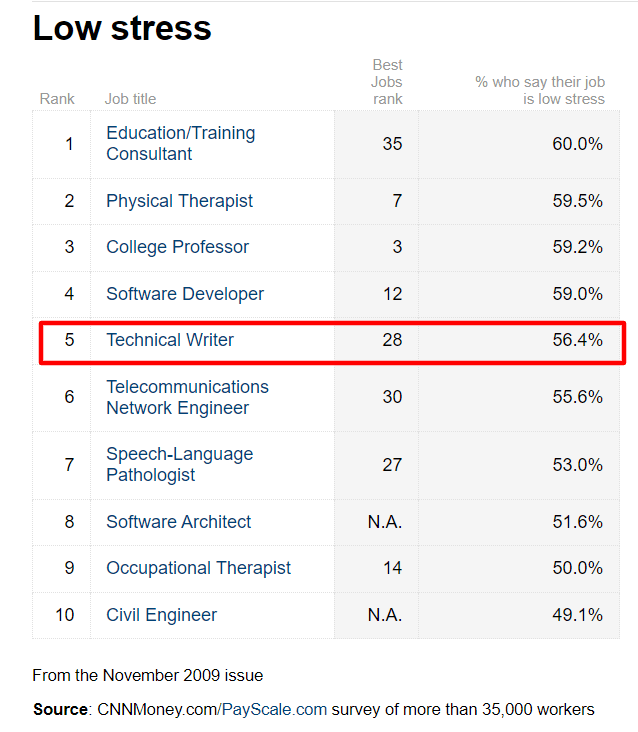
Source: CNN Money
There are many reasons for this positive outlook, and technical writers themselves often cite great independence and manageable workloads as the biggest contributors to the low-stress environment they work in.
For example, this technical writer on Reddit explains that working remotely enables them to do their job in peace (outside of a couple of meetings here and there). They point out that the workload can become somewhat substantial, but nothing they can’t manage with some organizational and communication skills.
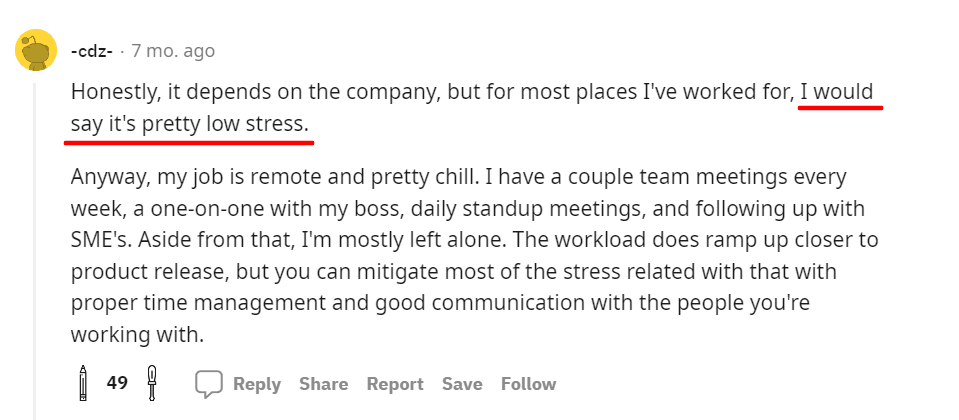
Source: Reddit
However, low stress doesn’t mean completely stress-free, so if you do decide this is the right kind of work for you, keep in mind that your job won’t always be relaxed and easy.
The source of stress for technical writers often comes from other stakeholders in the project, as well as how the project itself is organized and managed.
John Hedtke, a veteran writer with many technical writing projects, books, and articles under his belt, says he still feels stressed out in his job from time to time.
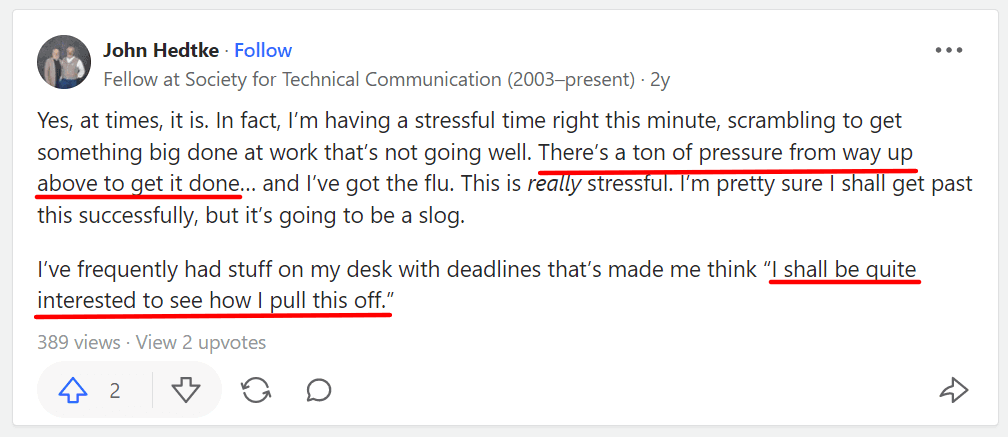
Source: Quora
In the following section, we’ll take a closer look at where stress comes from for technical writers by examining the common problems and challenges they face in their work.
What Makes Technical Writing Stressful
Stress at work can come from multiple sources. This is true for any profession, including technical writing, where project stakeholders, organizational problems, and issues with technology can contribute to making a technical writer’s job more difficult.
Here’s an overview of the most common stressors for technical writers.
Lack of Proper Tools
Too many managers and executives still don’t fully understand how technical writing works and what tools their writers need to be successful.
This can create a stressful environment for technical writers because they are expected to produce stunning, user-oriented, interactive documentation without the resources needed for the job.
A common example of this problem can be found in companies that do all of their technical writing using word processing software such as MS Word.
This software caters to users who need to input little more than ordinary text into their documents, which means it lacks many capabilities that are essential for quality technical writing.
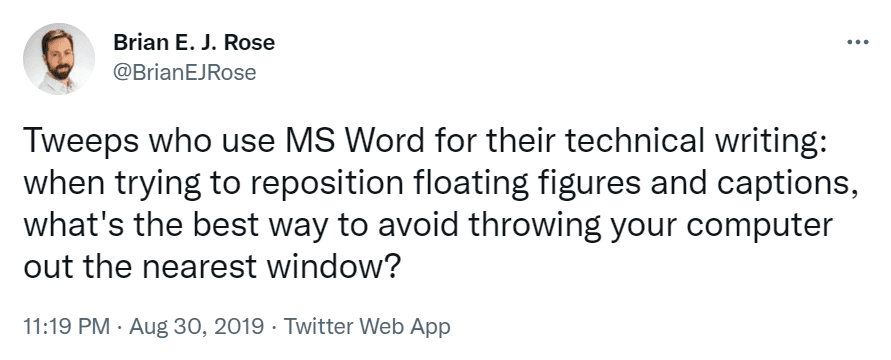
Source: Brian E. J. Rose on Twitter
Technical writers need to show, rather than just tell users how to use a product, meaning word processing software simply isn’t advanced enough to serve the needs of writers.
Technical writers aren’t necessarily developers, but that doesn’t mean their work isn’t dependent on quality tools.
When companies make writers work with tools that aren’t fit for the job, that can cause writers a lot of stress because they won’t be able to produce documentation that reflects their level of expertise.
Improperly Defined Projects
Writing technical documentation is difficult enough as it is, but it’s almost impossible to do when projects are improperly defined and lack substance and direction, which are crucial to the documentation process.
Projects that aren’t properly defined reflect uncertainty on the part of the stakeholders and are characterized by instability and too many changes. They can be recognized by some of the following signals:
- Frequent additions or subtractions of features to the product
- Shifting deadlines
- Last-minute changes to the product before launch
- Changes in the audience for the product
- Changes in the leadership of the project
These kinds of projects can be quite stressful for the technical writer. Writers will have trouble producing accurate and on-point documentation if the product itself isn’t properly defined and agreed upon.
They’ll also need to make constant rewrites to the documentation to keep up with the product's ever-changing nature, meaning they’ll need to write more documents faster but with less certainty.
Kesi Parker, a well-known technical writing expert, sums up the problem well:
Technical documentation cannot be prepared overnight. Researching and writing take time. When everything is ready, and you know that tomorrow or in a couple of days a new release will take place, it is so terrible to learn that developers decided to add a new feature to the product, and you’ll have to rewrite the docs.
Technical writers can’t write accurate docs if the product they’re working on hasn’t solidified and the project isn’t defined down to the last detail.
Quality documentation is impossible to create in such circumstances and that can cause a lot of stress for the technical writer.
Difficulties With Subject Matter Experts
To gain a complete understanding of the product and ensure their documentation is completely accurate and in line with how the product should be used, technical writers need to collaborate with subject matter experts (SMEs) during multiple stages of the documentation process.
This is where things get a little difficult for some writers. SMEs such as developers and technical leads are extremely busy people who often don’t prioritize documentation when the product is being developed.
Getting them to sit down and patiently explain how the product works can sometimes be an immense challenge.
In fact, many writers say working with SMEs is the hardest part of their job for exactly these reasons.
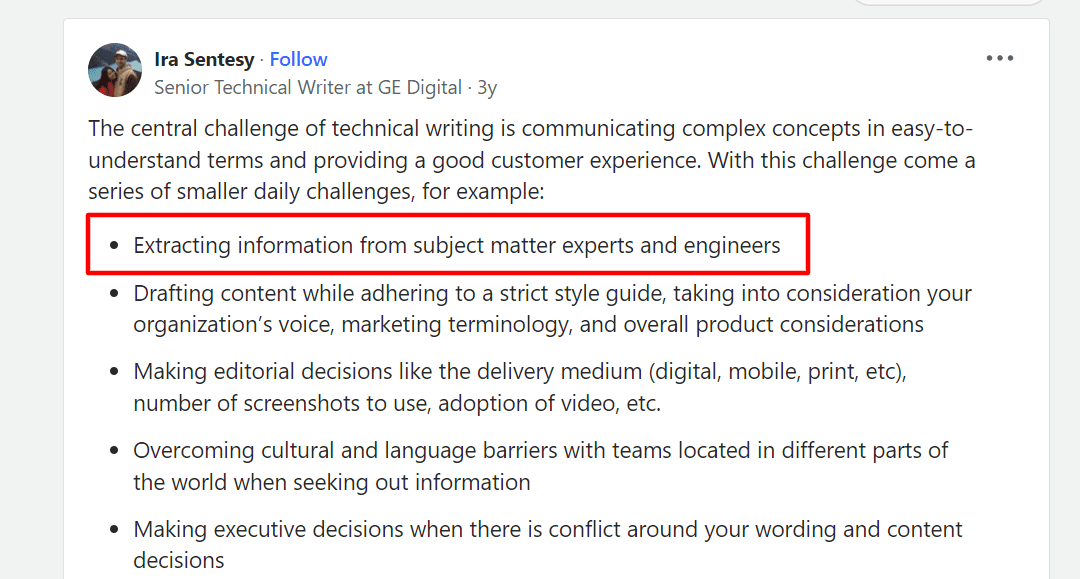
Source: Quora
Working with people who aren’t always cooperative can be a major source of stress in any line of work, and technical writers are no exception.
That’s why the veterans of the industry often warn junior writers to be ready to face some resistance when it comes down to interviewing SMEs ahead of the writing process.
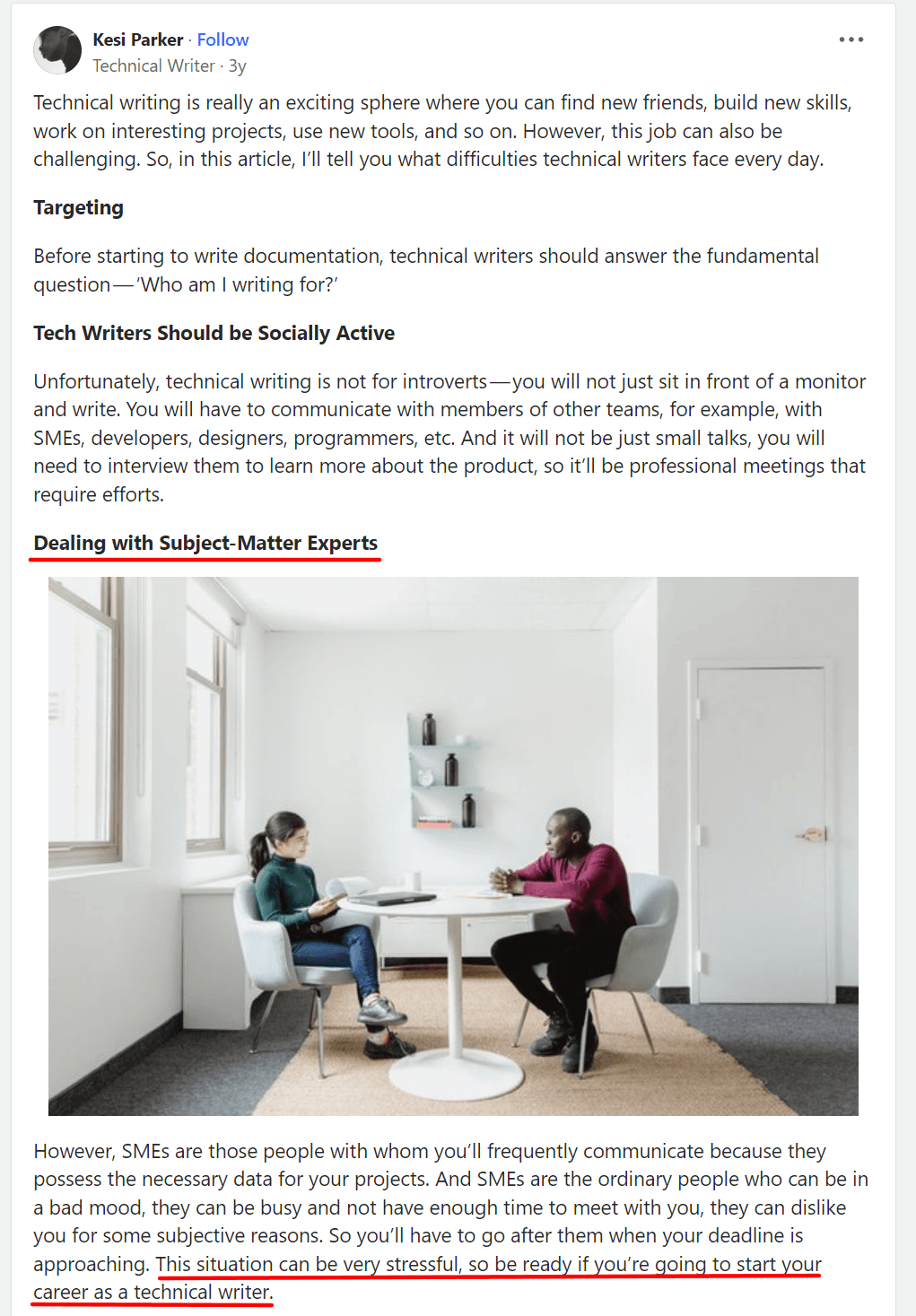
Source: Quora
As we said in a previous section, independence is important for a technical writer’s work. Having to collaborate with other stakeholders in the project, who aren’t always cooperative, is where a lot of their work-related stress can come from.
Questionable Job Security
The last spot on this list is reserved for what is probably the biggest stressor of any technical writer: poor job security.
Even though technical writers are extremely important for the success of a tech company, it seems that employers aren’t able (or willing) to hold on to them for very long. That’s apparent from the fact that around 35% of technical writers leave their company in under a year.
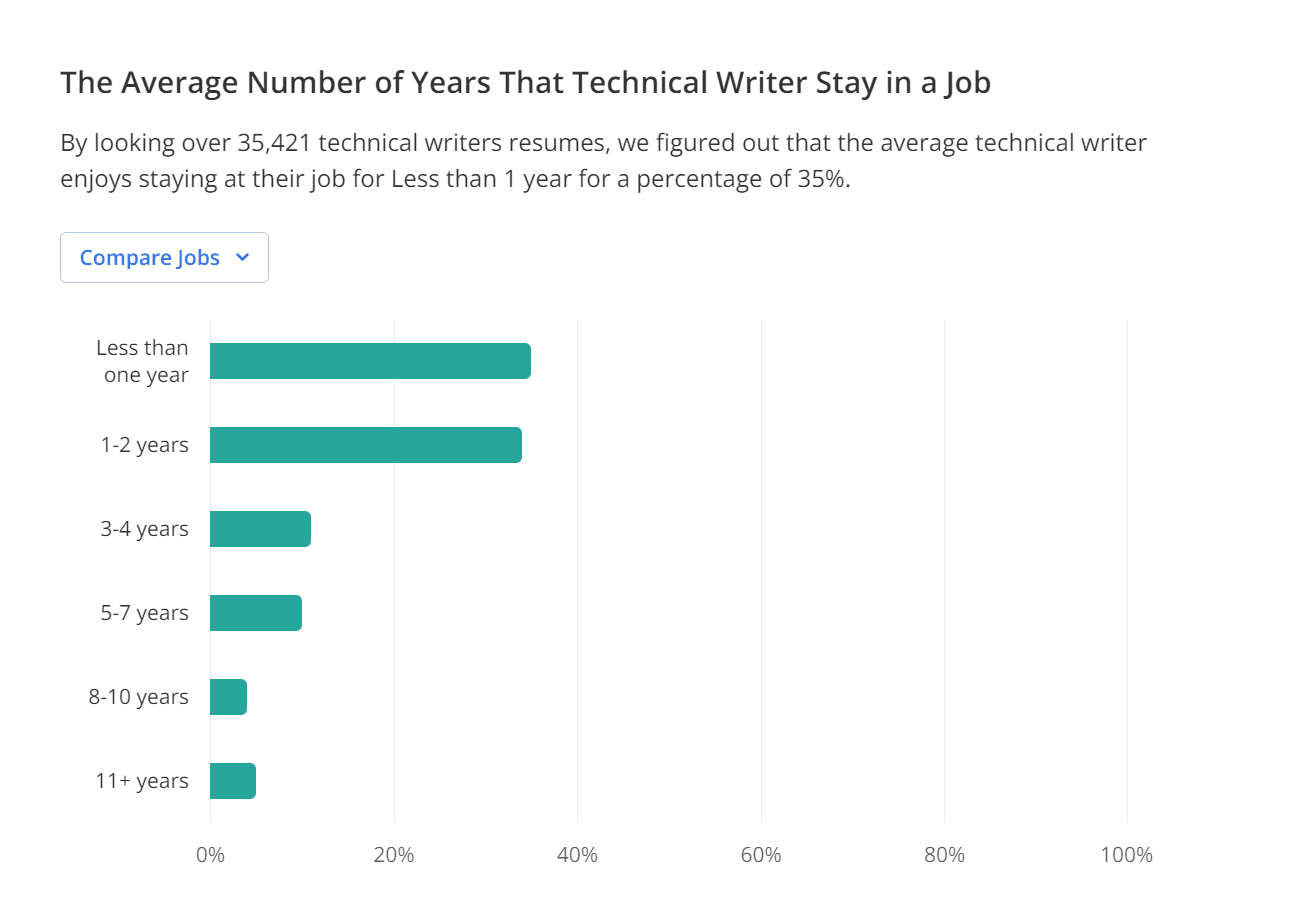
Source: Zippia
The problem seems to stem from the fact that the importance of technical writing is often underestimated within a company and technical writers seem to be given less respect than other experts (namely engineers and developers.)
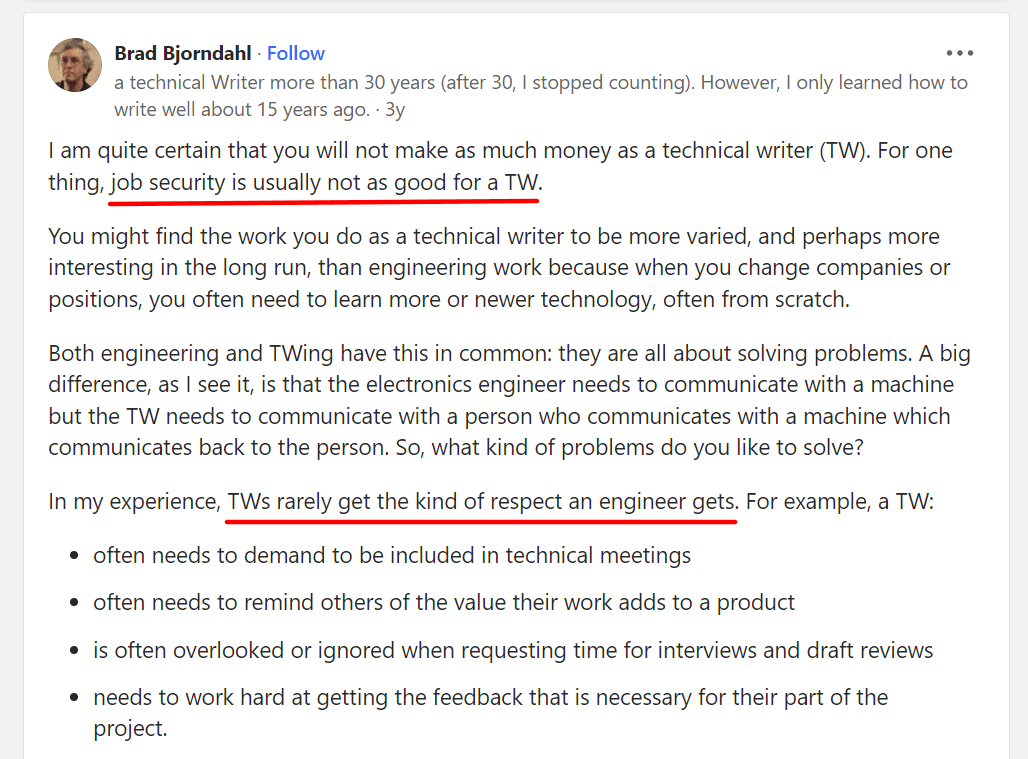
Source: Quora
The consequence of this is that a company might invest less effort in retaining a technical writer, or it might prioritize retaining other experts at the expense of the technical writing team when it needs to lay off workers.
Here’s an example of this scenario from an anonymous technical writer wondering about the lack of respect awarded to technical writers:
Our company, along with many others, recently furloughed many employees. We are an international company that works in retail manufacturing. We had five technical writers with a developer to writer ratio of 43:2. They furloughed three of the five. I and one other person remain. Percentagewise, although other teams are much bigger than us, our team took the biggest hit.
In conclusion, one of the biggest sources of stress for technical writers comes from the fact that they need to worry about keeping their jobs more than some other team members, such as engineers and developers.
Coping With Stress as a Technical Writer
In the last few sections, we described the common stressors technical writers face in their line of work. And while these challenges may seem daunting at times, technical writers have their own methods for combating them.
Next, we’ll see how technical writers can mitigate stress and make their job much more manageable and relaxed. Let’s tackle every stressor individually and propose some tried and true solutions.
Using the Right Tools for the Job
Technical writers work best when they have access to an arsenal of tools and software products. These help writers build technical documents that use all available means to present information that’s actually useful and easily digestible.
Here are just some of the tools technical writers use every day to do their best work:
- Documentation software
- Graphic design and video editing software
- Screenshotting tools
- Diagraming tools
- Text editing software and spell checkers
- Word processing software
If you want to reduce the stress of trying to create quality documentation from scratch, you should start building a technical writing stack that contains at least some of these tools.
The most powerful weapon in the technical writer’s arsenal is, of course, their documentation software.
Advanced documentation software like our own product, Archbee, will enable you to effortlessly create documents using plain text, multimedia, diagrams, and even code.
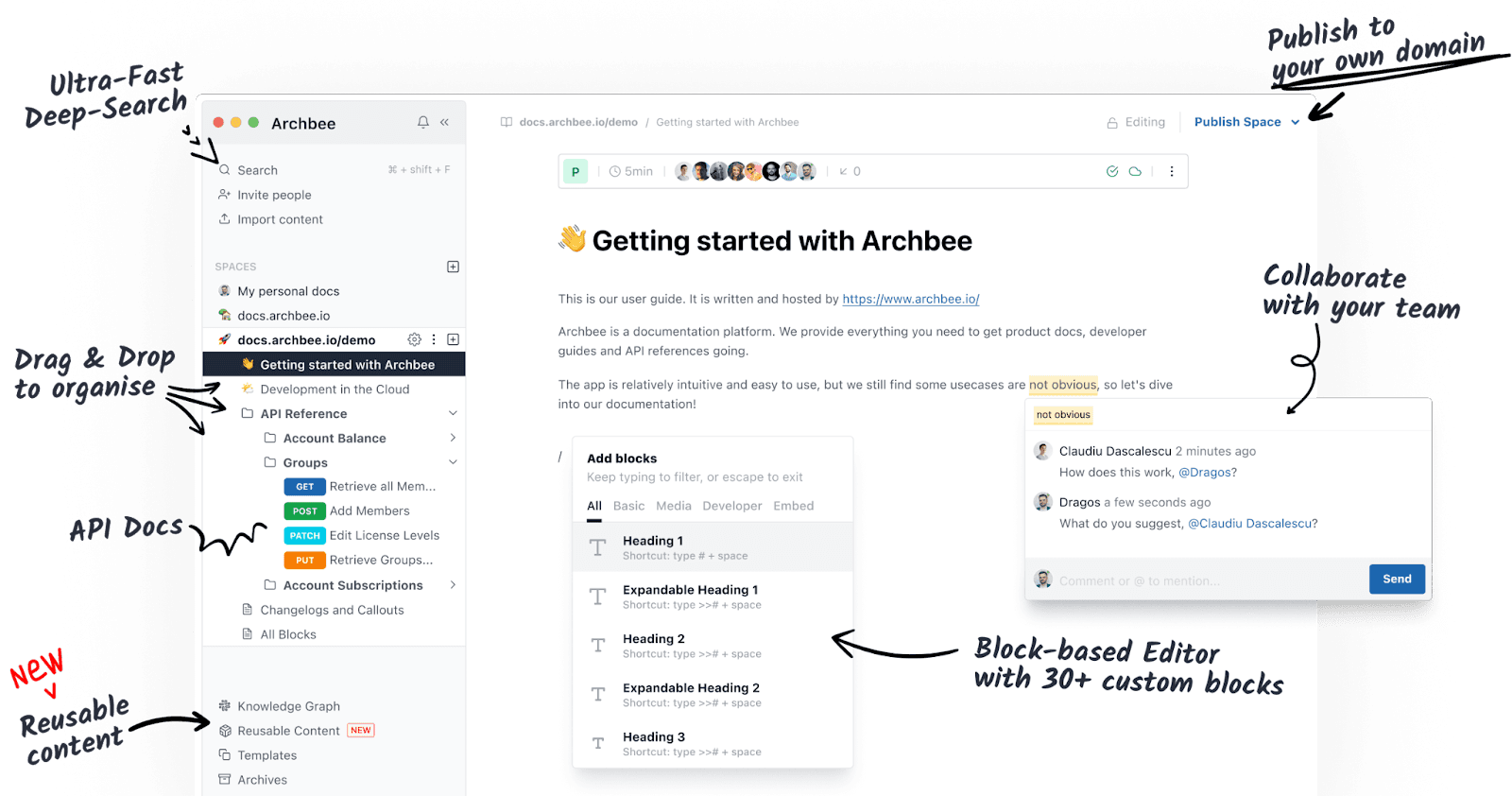
Source: Archbee
The right documentation software will also allow you to collaborate with other members of the team right there in the doc, as well as publish the document to your company’s domain in just a few clicks.
An ordinary word processor just isn’t powerful enough to take on tasks as complex as technical writing.
However, modern documentation software is developed with the needs of technical writers in mind, meaning it’s going to facilitate a writer’s work instead of putting obstacles in front of them. And that eliminates much of the frustration and stress technical writers feel.
Lessening the Impact of Improperly Defined Projects
The thing about improperly defined projects is that they do eventually crystallize. Therefore, if you want to mitigate the stress of documenting a project that isn’t defined down to the last detail, the answer might be to simply wait.
This approach to documentation is called “just in time” (JIT) documentation, and it’s part of the Agile approach to software development.
The logic behind JIT or Agile documentation is that the later you start documenting the product in the development process, the more solidified the product will become, meaning you’ll have a better idea of how to approach documenting it and will have to do fewer rewrites because changes are less likely to happen.
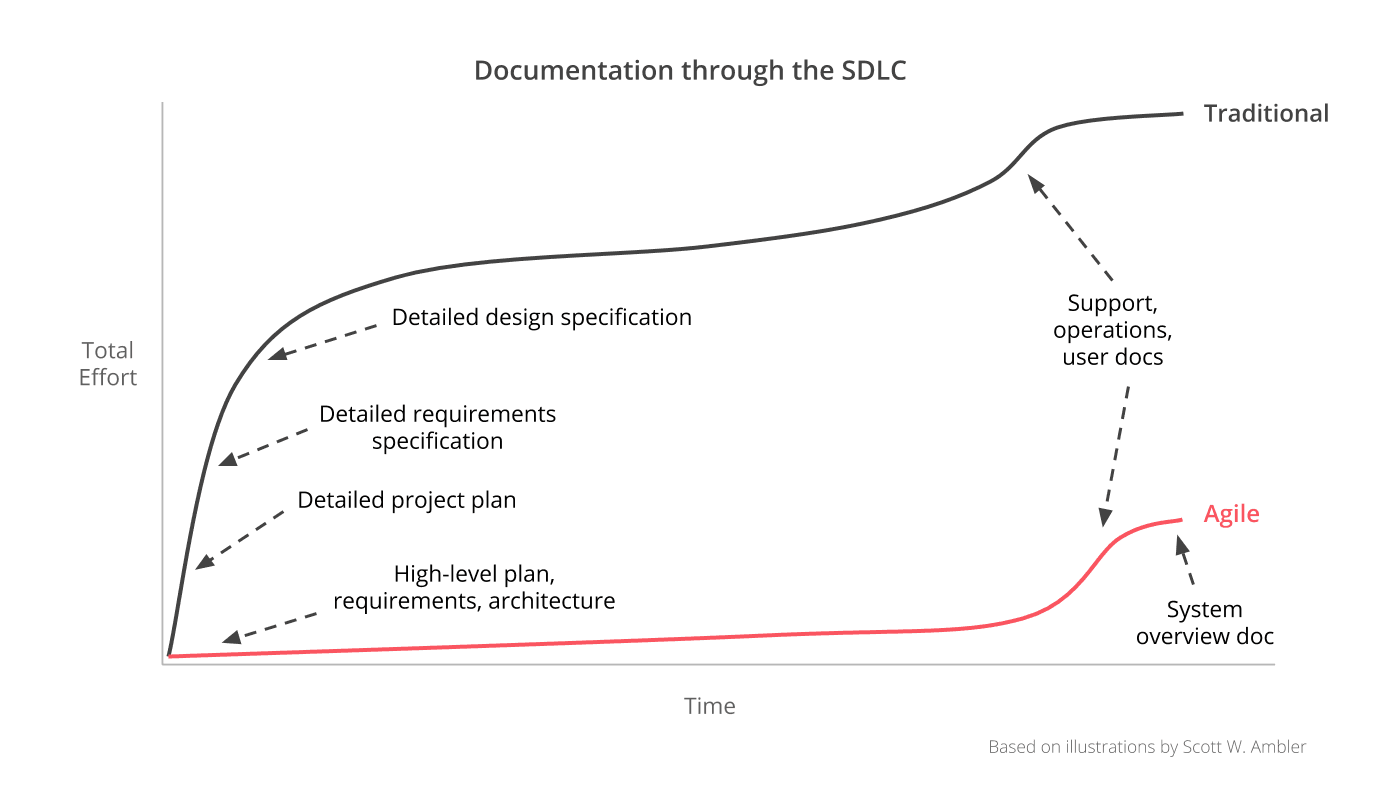
Source: Nuclino
As you can see in the diagram above, instead of being tackled in the beginning, when the development team still isn’t quite sure what the end product will look like, the documentation process is delayed until the project is unlikely to pivot.
That way, technical writers need to invest a lot less time and effort into creating documentation, meaning stress is kept at bay.
Handling Subject Matter Experts
As we said, working with SMEs can be quite challenging. The secret to eliminating stress from this aspect of technical writing is to keep in mind that the experts you need to talk to are ordinary people, just like you.
So, as you’re preparing for your SME interview, don’t just think about the topics you need to discuss. Consider the person you’ll be talking to and try to make the interview experience as pleasant and comfortable as possible, for all parties involved.
For instance, as you’re sitting down to talk, don’t skip the pleasantries and just dive straight into shop talk. Take the time to engage the SME on a human level by asking them how they are and thanking them for taking the time to talk to you.
It might also be a good idea to find out a couple of facts about the person and connect with them through a shared interest.
The “About us” page on your company website could be useful for that purpose.

Source: UWG
Not only will this take the pressure off the interview, but it will also make your interviewee a lot more likely to say yes to your subsequent requests for information, mitigating a lot of future stress as well.
Enhancing Job Security
Employers may sometimes underestimate technical writers, but the truth is that a well-rounded, quality writer is extremely difficult to find.
Why? Because the best technical writers have a very rare combination of skills. They’re amazing storytellers who can easily simplify even the most complex ideas, and they have a deep understanding of and interest in technology and software.
A writer profile like that is remarkably difficult to find, even for top employers such as Google.
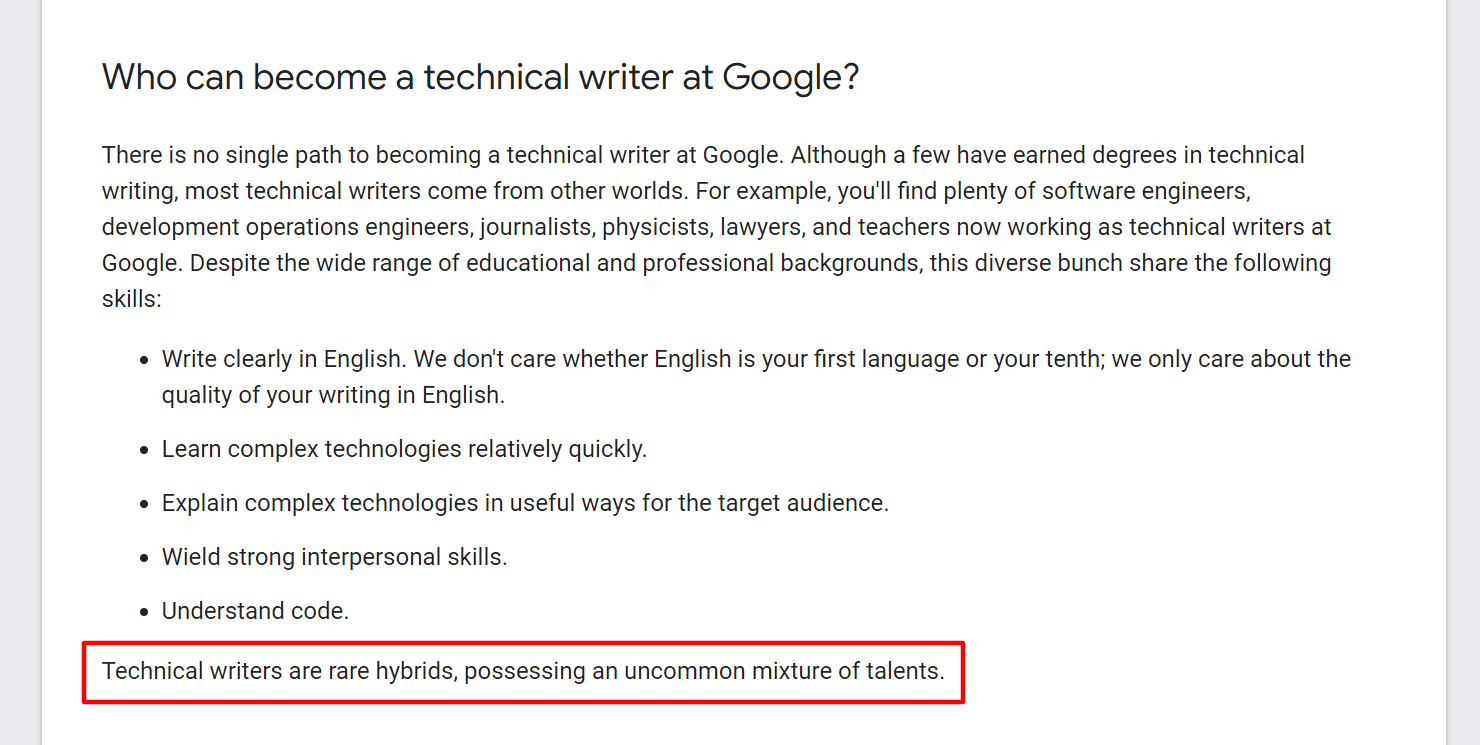
Source: developers.google
The point here is that technical writers who hone their writing and technical skills have a much better chance of becoming indispensable to their companies and can, therefore, rest easy in the knowledge that their job is secure.
So, for example, if you already know you have strong writing skills, a way to enhance your job security might be to learn the basics of coding so that you can have a better understanding of the software products you’re documenting and can work more independently.
There are free online coding courses you can take up right now to start developing your skills.

Source: Codecademy
A good writer who knows the basics of coding is a rare talent, so this is definitely a big investment in your future and can take away any worry about the security of your technical writing job.
Conclusion
Our discussion of work-related stress in the field of technical writing has produced some interesting conclusions.
To begin with, it’s important to know that technical writing is a relatively low-stress career path. That already makes it appealing to those of us who enjoy working in stable environments that allow us to focus and carry out deep work.
However, the territory does come with a couple of common stressors, such as inadequate technology, poor project management, difficulties in collaboration, and job insecurity.
Thankfully, each one of these sources of stress can be mitigated or even completely removed with some strategic thinking and good old hard work.
Try Archbee's full range of features with our free 14-day trial.
Frequently Asked Questions
Many technical writers experience manageable stress, but certain patterns reliably raise the pressure:
- Inadequate tools: Relying on basic word processors instead of purpose-built documentation platforms makes complex content harder to produce and maintain.
- Poorly defined or shifting projects: Ambiguous scope, moving deadlines, and last-minute changes drive constant rewrites and rework.
- Limited access to SMEs: Busy experts, slow reviews, and conflicting feedback can stall progress.
- Unrealistic timelines: Compressed schedules and release pivots force rushed docs and frequent edits.
- Job insecurity or low visibility: When documentation is undervalued, writers can feel less secure and more stressed.
- Communication gaps and context switching: Fragmented channels, unclear ownership, and frequent task-switching erode focus and create churn.
